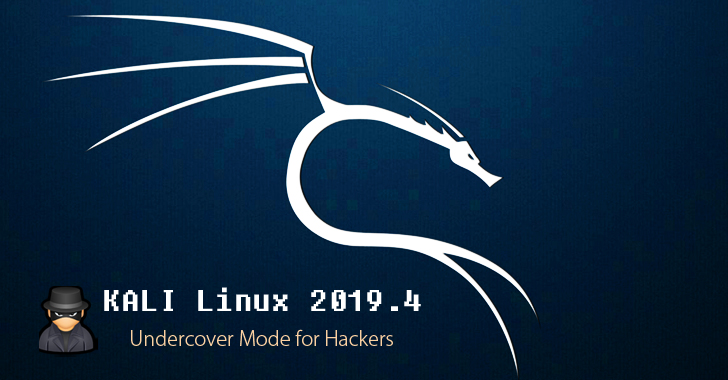Latest Kali Linux OS Added Windows-Style Undercover Theme for Hackers
You can relate this:
While working on my laptop, I usually prefer sitting at a corner in the room from where no one should be able to easily stare at my screen, and if you're a hacker, you must have more reasons to be paranoid.
Let's go undercover:
If you're in love with the Kali Linux operating system for hacking and penetration testing, here we have pretty awesome news for you.
Offensive Security today released a new and the final version of Kali Linux for 2019 that includes a special theme to transform your Xfce desktop environment into a Windows look-a-like desktop.
Dubbed 'Kali Undercover,' the theme has been designed for those who work in public places or office environments and don't want people to spot that you're working on Kali Linux, an operating system popular among hackers, penetration testers, and cybersecurity researchers.
As shown in the demo below, simply enabling "Kali Undercover Mode" from the menu would immediately turn your distinctive Kali dragon theme to the boring bluish version of the Windows operating system.
Besides Kali Undercover, the latest Kali Linux 2019.4 release, powered by Linux kernel 5.3.9, now also includes some new exciting updates, including:
The Offensive Security ARM images have also been updated to the latest 2019.4 version that will support 8GB sd cards on ARM.
However, the team assured that starting with the 2020.1 version, which is due in the new year, a 16GB sd card will be the minimum supported one, though users will be able to create their own images that support smaller cards.
Moreover, RaspberryPi kernel for Kali Linux was updated to version 4.19.81, and the firmware package was updated to include the eeprom updates for the RaspberryPi 4.
You can download the latest Kali Linux 2019.4 from its official website or from the Torrent network. If you are already running an existing Kali installation, you can simply upgrade it to the latest Kali release by running the command: apt update && apt -y full-upgrade.
While working on my laptop, I usually prefer sitting at a corner in the room from where no one should be able to easily stare at my screen, and if you're a hacker, you must have more reasons to be paranoid.
Let's go undercover:
If you're in love with the Kali Linux operating system for hacking and penetration testing, here we have pretty awesome news for you.
Offensive Security today released a new and the final version of Kali Linux for 2019 that includes a special theme to transform your Xfce desktop environment into a Windows look-a-like desktop.
Dubbed 'Kali Undercover,' the theme has been designed for those who work in public places or office environments and don't want people to spot that you're working on Kali Linux, an operating system popular among hackers, penetration testers, and cybersecurity researchers.
As shown in the demo below, simply enabling "Kali Undercover Mode" from the menu would immediately turn your distinctive Kali dragon theme to the boring bluish version of the Windows operating system.
Besides Kali Undercover, the latest Kali Linux 2019.4 release, powered by Linux kernel 5.3.9, now also includes some new exciting updates, including:
- Xfce Desktop A new default, lightweight desktop environment aiming to improve the performance and user experience.
- PowerShell Support This gives you the ability to execute PowerShell scripts directly on Kali.
- Kali NetHunter KeX This allows you to attach your Android device to an HDMI output along with Bluetooth keyboard and mouse and get a full Kali desktop on your smartphone.
- New GTK3 theme A new desktop theme for both Xfce and GNOME desktops.
- Kali Documentation Moved Kali docs to "/docs/," which is now Git powered where anyone can contribute for better public documentation.
- BTRFS during setup Supports setting BTRFS as your root file system allowing you to perform file system rollbacks after upgrades.
The Offensive Security ARM images have also been updated to the latest 2019.4 version that will support 8GB sd cards on ARM.
However, the team assured that starting with the 2020.1 version, which is due in the new year, a 16GB sd card will be the minimum supported one, though users will be able to create their own images that support smaller cards.
Moreover, RaspberryPi kernel for Kali Linux was updated to version 4.19.81, and the firmware package was updated to include the eeprom updates for the RaspberryPi 4.
You can download the latest Kali Linux 2019.4 from its official website or from the Torrent network. If you are already running an existing Kali installation, you can simply upgrade it to the latest Kali release by running the command: apt update && apt -y full-upgrade.

